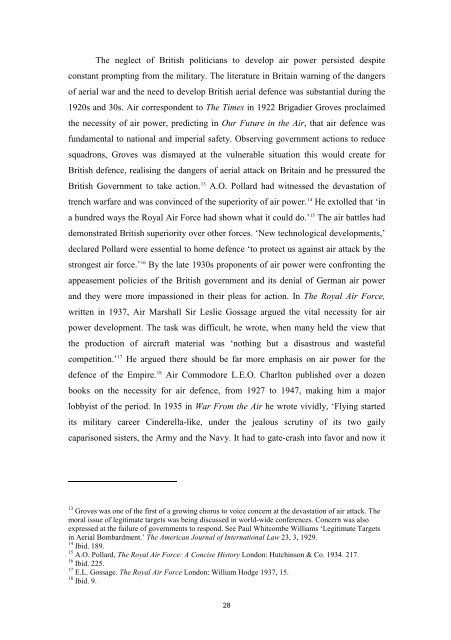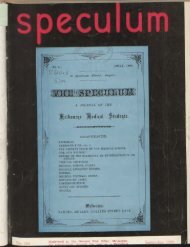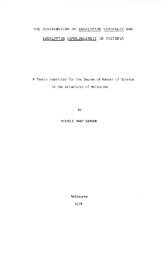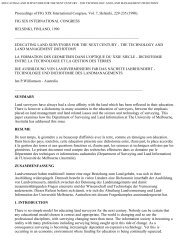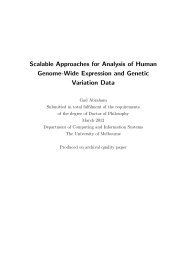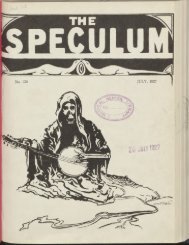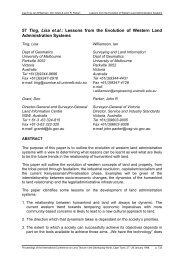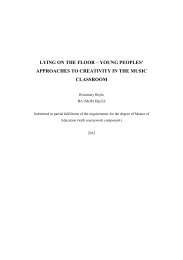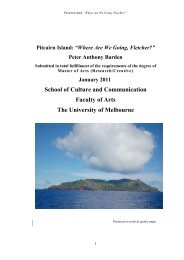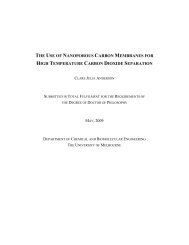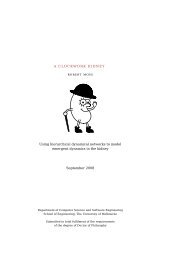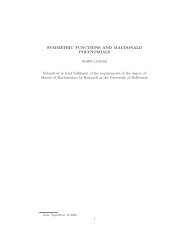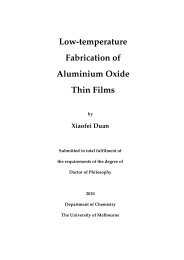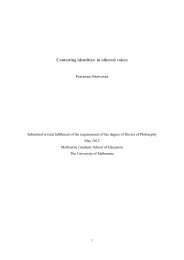- Page 1: The Empire Air Training Scheme: Ide
- Page 4 and 5: nature of the national and individu
- Page 6 and 7: PrefaceMy interest in the Empire Ai
- Page 8 and 9: Table of contentsAbstract .........
- Page 11 and 12: List of IllustrationsFigure 1 Postc
- Page 13 and 14: from the 1930s, to post war decades
- Page 15 and 16: and the RAF, two of the dominion hi
- Page 17 and 18: Yet within several decades EATS had
- Page 19 and 20: lives. 26 Stuart Ward is one of man
- Page 21 and 22: flag, serve the King, and cheerfull
- Page 23 and 24: The concepts of Empire, masculinity
- Page 25 and 26: form the stories we choose to tell
- Page 27 and 28: Australian involvement in EATS. 57
- Page 29 and 30: The last source used is the intervi
- Page 31 and 32: The focus of Chapter 2 is the initi
- Page 33 and 34: contradictions between illusion and
- Page 36 and 37: CHAPTER 1Aerial War Comes of AgeWit
- Page 40 and 41: ules the roost.’ 19 More than man
- Page 42 and 43: enemy was doomed to suffer continua
- Page 44 and 45: emarked on trait of Australian fore
- Page 46 and 47: Empire Air Scheme.’ 47 While stro
- Page 48 and 49: are also hesitant in confronting th
- Page 50 and 51: not just an aircraft but also had a
- Page 52: Third, was the human element. Seduc
- Page 55 and 56: Frank was one who was delighted to
- Page 57 and 58: The images constructed around EATS
- Page 59 and 60: anger and lack of hope persisted.
- Page 61 and 62: Although he did not complete in the
- Page 63 and 64: The ethos of the glamour of serving
- Page 65 and 66: the male body for service as an ess
- Page 67 and 68: promoting the thrill of conquest an
- Page 69 and 70: Figure 7 Wings over Europe 56Public
- Page 71 and 72: only 18 and the concept of the self
- Page 73 and 74: the masculine role. 65 The real val
- Page 75 and 76: country, defence of Empire.’ 71 A
- Page 77 and 78: RAF. 80 Here the entries are obsess
- Page 79 and 80: Of all the days and nights of swotA
- Page 81 and 82: very last moment. When I got back I
- Page 83 and 84: wills giving every thing to our mat
- Page 85 and 86: CHAPTER 3This is Really It. The Ima
- Page 87 and 88: to interpret experiences once they
- Page 89 and 90:
studied through representations suc
- Page 91 and 92:
1942. One of the Valiant. Till then
- Page 93 and 94:
in afternoon and dance in camp. Ele
- Page 95 and 96:
for.’ 38 He confessed to a consta
- Page 97 and 98:
occasions and, on return to Austral
- Page 99 and 100:
Figure 12 Halifax Crew 51In Halifax
- Page 101 and 102:
strength is emphasised in the elati
- Page 103 and 104:
Death was glorified through the thr
- Page 105 and 106:
kills or is killed. It’s exciting
- Page 107 and 108:
The images that glorified war were
- Page 109 and 110:
egan his diary had become strangely
- Page 111 and 112:
memorialise their valor, Bulcock’
- Page 114 and 115:
CHAPTER 4A Diminishing Image‘Empi
- Page 116 and 117:
efore, makes the devastation of the
- Page 118 and 119:
‘The Empire School of Drama’ wh
- Page 120 and 121:
Europe, explained the process as on
- Page 122 and 123:
original announcement of Australia
- Page 124 and 125:
we don’t get the detail. I hope t
- Page 126 and 127:
prompted a public debate around the
- Page 128 and 129:
administered by a War History Commi
- Page 130 and 131:
George Odgers remained silent on ma
- Page 132 and 133:
historians’ accounts revealing th
- Page 134 and 135:
individuals are important in buildi
- Page 136 and 137:
institution of Empire and does not
- Page 138 and 139:
the formation of individual identit
- Page 140 and 141:
CHAPTER 5Reconstruction of the Imag
- Page 142 and 143:
suggestion that control would be su
- Page 144 and 145:
attitudes towards the plan. 14 Both
- Page 146 and 147:
strengthening Empire relationships,
- Page 148 and 149:
Forming the Australian Collective I
- Page 150 and 151:
No. 1 Initial Training School This
- Page 152 and 153:
Figure 20 Memorial to eight English
- Page 154 and 155:
Australian forces for her own defen
- Page 156 and 157:
the Scheme in wider military accoun
- Page 158 and 159:
like it.’ Coulthard Clarke direct
- Page 160 and 161:
writing of history, Peter Stanley a
- Page 162 and 163:
and culture of the airmen would be
- Page 164 and 165:
Lack of Moral Flying (LMF) at any s
- Page 166 and 167:
Moonlight developed into a delibera
- Page 168 and 169:
collective memory, in a country ‘
- Page 170 and 171:
picture of national values. Announc
- Page 172 and 173:
In every generation there emerges a
- Page 174 and 175:
military aviation, military aircraf
- Page 176 and 177:
CHAPTER 6Reconciling Contradictory
- Page 178 and 179:
in forming an identity. 4 This incl
- Page 180 and 181:
While such recollections appeared t
- Page 182 and 183:
narrative, while acknowledging time
- Page 184 and 185:
We were the last boat out of Englan
- Page 186 and 187:
without the organisation of the Bri
- Page 188 and 189:
arrived home I realized I was in th
- Page 190 and 191:
We landed at Melbourne on a Saturda
- Page 192 and 193:
national identity. The first was th
- Page 194 and 195:
jumps up. So, I said, “You tell h
- Page 196 and 197:
I borrowed my own aircraft, and fle
- Page 198 and 199:
CHAPTER 7The Masculine Image Challe
- Page 200 and 201:
epresented the individual human dim
- Page 202 and 203:
The historical culture surrounding
- Page 204 and 205:
masculine qualities. 29 The dominan
- Page 206 and 207:
would offer an outlet and encourage
- Page 208 and 209:
While several Australian psychiatri
- Page 210 and 211:
under conditions of stress, as ‘t
- Page 212 and 213:
was built, have been relativised an
- Page 214 and 215:
Despite arguments that social value
- Page 216 and 217:
veterans including airmen, claimed
- Page 218 and 219:
People forget what a war was really
- Page 220 and 221:
one of the buggers we could see.’
- Page 222 and 223:
predominant feeling of powerlessnes
- Page 224 and 225:
‘didn’t even know I was in the
- Page 226:
in short, don’t cry. 132 R.W.Conn
- Page 229 and 230:
a socially accepted narrative in wh
- Page 231 and 232:
of what is not socially acceptable
- Page 233 and 234:
qualities that underpinned the stor
- Page 235 and 236:
While certain veterans of EATS have
- Page 237 and 238:
image, in a patriotic interplay bet
- Page 239 and 240:
Talking of blood, as I floated down
- Page 241 and 242:
as his mascot.’ He excelled in bo
- Page 243 and 244:
The point is not in the story but w
- Page 245 and 246:
personally got in on the tail end o
- Page 247 and 248:
ush. The airman symbolized the age
- Page 249 and 250:
120. We are down because we are all
- Page 251 and 252:
Thus, in squadron histories airmen
- Page 253 and 254:
459 and nine other squadrons. It wa
- Page 255 and 256:
press. I don’t talk about it very
- Page 257 and 258:
encapsulated the fundamental comple
- Page 259 and 260:
The focus of Anzac commemoration is
- Page 261 and 262:
convincing. Responses of veterans w
- Page 263 and 264:
CANADIAN WAR MUSEUM INTERVIEWSThe f
- Page 265 and 266:
Berglund, Geoffrey. Private Papers
- Page 267 and 268:
JOURNALS OF RAAFWINGS 1939-46.RAAF
- Page 269 and 270:
, More Charlton London: Longmans &
- Page 271 and 272:
Officer, George John. Six O’Clock
- Page 273 and 274:
Batchelder, Alf. Only Yesterday: Do
- Page 275 and 276:
Buckner, Phillip. Canada and the En
- Page 277 and 278:
Crotty, Martin. Making the Australi
- Page 279 and 280:
Dudink, Stephan, Karen Hagemann, an
- Page 281 and 282:
Granatstein, J.L. Canada at War: Th
- Page 283 and 284:
Fingarette, Herbert. Self Deception
- Page 285 and 286:
Kansteiner, Wulf. ‘Finding Meanin
- Page 287 and 288:
Lotringer, Sylvere. ed, Michael Fou
- Page 289 and 290:
Modjeska, Drusilla. Stravinsky’s
- Page 291 and 292:
Paris, Michael. Winged Warfare: the
- Page 293 and 294:
Sassoon, Siegfried. The Complete Me
- Page 295 and 296:
Stoddart, Brian, ‘Sport, Cultural
- Page 297 and 298:
Wastell, Collin. Understanding Trau
- Page 299 and 300:
Blair, Dale, ‘Beyond the Metaphor
- Page 301:
Griffith Soldier Settlers Memorial.


